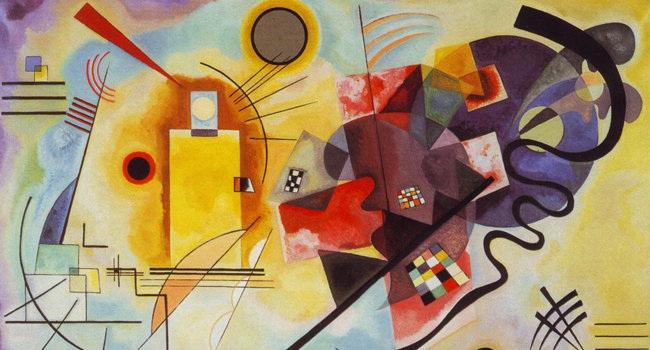
Cultural Psychology of Ruptures and Reconstructions
This is the main annual course for the Doctoral Programme in Cultural Psychology. This year’s focus will be on the key themes of ‘ruptures’ and ‘reconstructions’.
Tidspunkt
08.08.2016 kl. 10.00 - 12.08.2016 kl. 16.00
Beskrivelse
Picture: Wassily Kandinsky: Gelb-Rot-Blau
Hosted by Brady Wagoner
This is the main annual course for the Doctoral Programme in Cultural Psychology. Its goal is to introduce early stage researchers to theoretical, technical, methodological and research knowledge in the field and approach of cultural psychology. The course includes a variety of lectures, group discussions, practical tasks, data sharing and analysis, academic writing tasks and more.
This year’s focus will be on the key themes of ‘ruptures’ and ‘reconstructions’, topics of considerable generality to interest a wide-range of researchers. It covers the micro-dynamics of interactions, through life-course changes to societal processes. In particular, there will be a focus on how these concepts play out in terms of memory and imagination, on both individual and collective levels.
Participation in the Summer School will give you 7 ECTS points.
Programme
Day 1 – Monday 8th
10.00 – 12.00 Welcome and introduction to the course
Description: We will both get to know participants and provide an overview of the week.
12.00 – 13.00 Lunch
13.00 – 14.30 Lecture on ‘Some Principles of Cultural Psychology’—Brady Wagoner
Description: This lecture will introduce the general analytic focus of cultural psychology, namely the mutual constitution of persons and social-cultural worlds. This will be illustrated with case studies of language development and the existential search for meaning.
14.30 – 15.00 Break
15.00 – 16.00 Lecture on ‘The Concepts of Ruptures and Reconstructions’—Ignacio Bresco, Sarah H. Awad & Brady Wagoner
Description: This lecture introduces the key concepts of ruptures and reconstructions which will be further elaborated through the following days.
16.00 – 17.00 Discussion of key concepts in relation to student projects
Day 2 – Tuesday 9th
09.00 – 12.00 Lecture on ‘Cultural Life Course Studies: A cultural psychological perspective on ontogenesis’—Pernille Hviid
Description: This lecture will introduce “Cultural Life Course Studies,” drawing on ‘classic’ cultural-historical psychology and including some “grand oldies,” such as William Stern & J. M. Baldwin. It will use the empirical case studies of children’s development, highlighting children’s experiences of developing.
12.00 – 13.00 Lunch
13.00 – 14.00 Pair discussion on ‘how can or cannot the cultural life course perspective be useful in your work?’
14.00 – 14.15 Break
14.15 – 16.45 Group work: Memory-lab: Sharing your child-life.
For this group-work please choose and bring one photo of you as a child.
16.45 – 17.15 Experiences from the day and the group work.
Day 3 – Wednesday 10th
09.00 – 12.00 Lecture on ‘Memory reconstruction for the future: The case of refugees’—Ignacio Brescó
This lecture will address the topic of refugees from two angles. First it will look at the social representations of refugees from the point of view of host societies. Second, it will examine the reconstructive process whereby refugee claimants have to provide an autobiographical account in order to meet the legal requirements to get the refugee status. Ruptures and reconstructions will be analyzed in both cases.
12.00 – 13.00 Lunch
13.00 – 14.00 Lecture on ‘The social life of images in the public sphere’—Sarah H. Awad
14.00 – 14.15 Break
14.15 – 16.45 Group work: Image analysis
Description: This activity will involve analyzing images that have circulated within Danish society and the different interpretations attached to them. In particular, the images will concern representations of refugees.
16.45 – 17.15 Experiences from the day and the group work.
Day 4 – Thursday 11th
09.00 – 10.00 Lecture on ‘Urban Psychology’
Description: This lecture will introduce key ideas from urban psychology together with the methods of ‘walk along’ and ‘mental maps’.
10.00 – 11.00 City walk
Description: To trigger ruptures and explore reconstructions. It will also involve watching for images and graffiti to connect to previous day.
11.00 – 12.00 Discussion on walk
12.00 – 13.00 Lunch
13.00 – 14.00 Discussions of student projects
14.00 – 14.30 Break
14.30 – 17.00 Discussions of student projects
Day 5 – Friday 12th
09.00 – 12.00 Panel discussion on ‘How to be(come) a research’
Description: This panel discussion will take form as a group discussion with four researchers; Giuseppina Marsico (postdoc), David Carré (PhD), Jensine Nedergaard (PhD), and Rebekka Mai Eckerdal (MA). As many of you have probably experienced there are many unanswered questions and implicit information in the closed world of academics. On this premise the open involving group discussion will confront questions such as how you get a position at different levels, where to publish, what to be aware of, what sacrifices should you be willing to make in your private life, what have been the most fruitful learning etc. The aim is to have an open discussion facilitated by different level researchers sharing their experiences and tricks to survive in academics. Everyone is expected to join the discussion and bring questions to the table.
12.00 – 13.00 Lunch
13.00 – 14.00 Wrap up including instructions on how and when to hand in papers.
Lecturers
Professor Brady Wagoner, AAU (confirmed)
Associate Professor Ignacio Brescó, AAU (confirmed)
Associate Professor Pernille Hviid, Copenhagen University (confirmed)
PhD Student Sarah Awad, AAU (confirmed)
Assistant Researcher Rebekka Eckerdal, AAU (confirmed)
Key Literature
Valsiner, J. (2014). An Invitation to Cultural Psychology. London: Routledge.
Wagoner, B. (2016). The Constructive Mind: Frederic Bartlett’s Psychology in Reconstruction. Cambridge: Cambridge University Press.
Zittoun, T., Valsiner, J., Salgado, J., Gonçalves, M. M., Vedeler, D., & Ferring, D. (2013). Human Development in the Life Course: Melodies of Living. Cambridge: Cambridge University Press.
Hotels in the vicinity of the venue:
Hotel Aalborg (Sømandshjemmet)
Other local accommodation options:
Deadline for registration: July 15
The summer school is open for PhD and master level students. It is free for Danish students but costs 2000 kr for everyone else.
Pris
Free/2000 kr
Arrangør
Brady Wagoner
Adresse
Rendsburggade 14, Room 5.127
Tilmelding inden
15.07.2016 kl. 12.00
